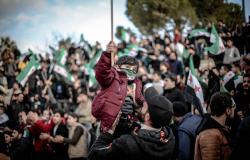GELI Stories – Taking Risks as a Leader to protect child rights in Syria

In the fifth of this series of podcasts with UN and other aid leaders making change happen on the frontline, I talked to Panos Moumtzis, who now leads the GELI programme, about some top influencing he did in a previous job as UN Humanitarian Coordinator for Syria.
Duncan: Welcome to GELI stories. I’m with Panos Moumtzis who in 2018 was the UN Humanitarian Coordinator for the Syrian response, based in Amman. He has a really interesting influencing story around persuading one of the warring parties to stop using children. Panos, welcome.
Panos: Thank you. In the Syrian context at that time, about maybe half the country was controlled by the government and the other half were non-state actors. In my capacity as a regional humanitarian coordinator, it came to my attention through the protection cluster and humanitarian actors on the ground that in the northeast of Syria, one of the non-state actors, the Kurdish force, was using children – young boys primarily, age 8, 10, 12 – in the armed forces. So we put our heads together to think what could we do in order to ensure the protection of the children who clearly should have been at school, not with the soldiers. We devised a strategy and started working first more at the technical level on the ground, with the immediate counterparts who facilitated access and managed checkpoints and so on, trying to influence them to stop the recruitment of these children.
Duncan: So what were the children being used for?
Panos: The children were used to man checkpoints. They were armed – they were these kids, really, with a Kalashnikov standing on checkpoints, (there were quite a lot of checkpoints!). Some of them were used for cooking, for cleaning, for support roles within the armed forces. Clearly there had to be an intervention with the leadership of the armed forces. We devised a strategy together with UNICEF, Save The Children and a couple of other actors for how to best impress upon the Kurdish armed forces to stop this practice.
I actually had a number of meetings with their leadership. It was highly sensitive because, first of all, the country is divided. With our exchange with them, we were not bringing any official recognition or political message – it was really about disarmament of the children. Of course, we were worried that an outside group would look at the engagement with the United Nations as sending a political message. We were also very aware that the government in Damascus would have been very upset; Turkey would not have been happy with this engagement with them. We were highly driven by the protection of the rights of the children. These children should not be there.
I was approached and I engaged with the senior leadership of the non-state actor group and actually I found them quite responsive – they asked to meet in Beirut. I wanted to make sure it was a discreet meeting, so we were in a hotel on a level two basement in a conference room … I didn’t want any pictures, I wanted just to have a conversation. We identified on their side there was a woman who was in charge of humanitarian action and we also wanted to meet the military guys. We found that they were quite receptive and at the same time we looked into who could have influence over them. We looked into countries that they were in contact with and asked them also to engage and this was really the coalition countries that were operating in the north east of Syria, so it was also a military to military conversation, pressing upon them the principles that they had to adhere to.
Duncan: So this is the Americans, the Brits, the Europeans who were with the Kurds in this fight?
Panos: Yes – I met the military leadership of the coalition and they were all very sympathetic and supportive and said actually this is something we can do. At the time a coalition of Western countries were operating in that area and they had an engagement with the Kurdish forces. That discussion went back and forth for six months, until finally they said they were willing to sign an agreement on disarmament. Then it became an issue who would sign, it came to me, we also had the UNICEF special envoy who agreed to do so, and an agreement was signed. And it was quite interesting to hear back from my colleagues that really it was quite rapid; they stopped seeing children at checkpoints, and we followed up also with them and they said all kids under 16 were all returned back to their families and were no longer with them.
Duncan: So what did your bosses say?
Panos: It was a decision that we took on the ground, but I alerted my bosses and I think it was understood, including UNICEF at the highest level, that it was a child protection issue, and there was an agreement to go ahead with it. There was also communication with everybody on all sides of the conflict to say that this was going to happen. It was a successful outcome to a very politically sensitive discussion. I needed to take the decision to go ahead with it, which wasn’t without risks. The risk whenever you deal with a non-state actor, with an armed group, first of all, is that they need to behave and honour a principle, in this case the disarmament of children. Secondly, the host government in Syria, who is all the time concerned about their sovereignty and respect for their state. And then the neighbouring countries, tensions, sensitivities, there was a Kurdish group within Turkey, within Iraq, so there were quite a lot of risks involved. But we took the risk, the calculated risk, to go ahead and do it, because it was the right thing to do.
Duncan: How did you minimise the risks? Was there anything you could do in that situation, rather than just hope they didn’t notice?
Panos: No, we proactively informed everybody that this was what was happening.
Duncan: So you told Syria, you told…
Panos: Yes, we said that we’re concerned about the protection of the children and that it’s something that was happening. There was information sharing about this happening and of course they were not happy with it. And even after the signature took place, there was a letter of complaint. I think it was to UNICEF primarily. But for us, it’s absolutely worth it because the reason we do this job is really to be able to speak up on people’s rights, on vulnerable people’s rights, whether it was questions related to women or girls, or in this case with children. There, we really needed to intervene and to do the right thing. In the work we do, we’re guided by values, which means that there are situations where we have to push the boundary, we have to push the line, and ask everybody to show respect.
Duncan: I mean, this seems wonderful, first of all… I mean a real success story… but basically everybody was very well behaved.
Panos: It wasn’t as straightforward as that because first of all within the Kurdish leadership, it wasn’t until we reached the very top that the decision was made. The lower levels were unresponsive and it took a few months before we were able to get to the top to have these meetings. Then they said ‘Absolutely, we want to be a responsible armed force’. I think it was also the time where they still wanted to be seen as part of the war on terror forces, and they wanted to adhere to these principles in a political context where they were arguing that there had to be political change and so on.
Duncan: So did you make those arguments? Did you say this is how modern armies fight? They don’t use children?
Panos: We have what we call the civ-mil collaboration – civilian to military exchange, and we have some trainings we offer as humanitarians to armed groups around the world in terms of giving awareness on principles around humanitarian work – partiality, neutrality, independence – and then we inserted there principles related to protection of children in this case, and UNICEF was part of that, so we really asked them to adhere to this.
Duncan: Did you offer them that training then?
Panos: Absolutely and this was done through the civ-mil collaboration – I mean it’s a training we offer around the world to armed groups in order to make sure that humanitarian work is respected, and we were very happy when this happened.
Duncan: Panos Moumtzis, thank you very much!
The Global Executive Leadership Initiative - GELI - is a leadership development programme designed exclusively for top-level leaders from the United Nations, NGOs, and the Red Cross and Red Crescent Movement. Global Policy's Tom Kirk facilitates it alongside Duncan.
Photo by Ahmed akacha


